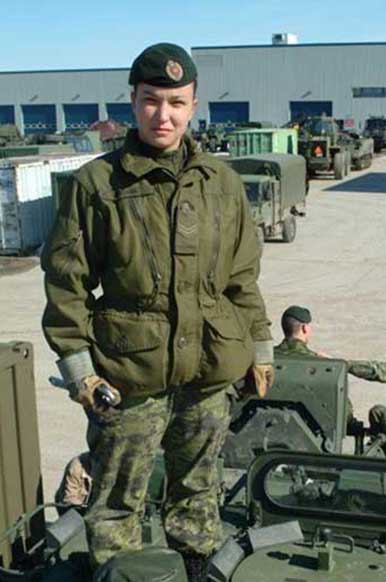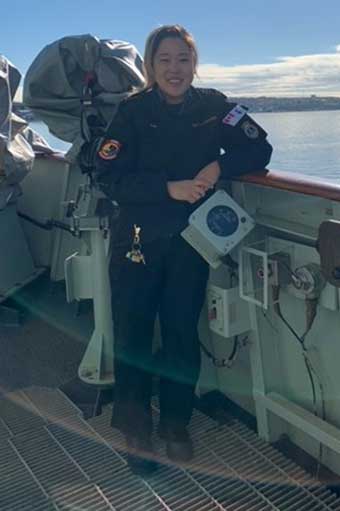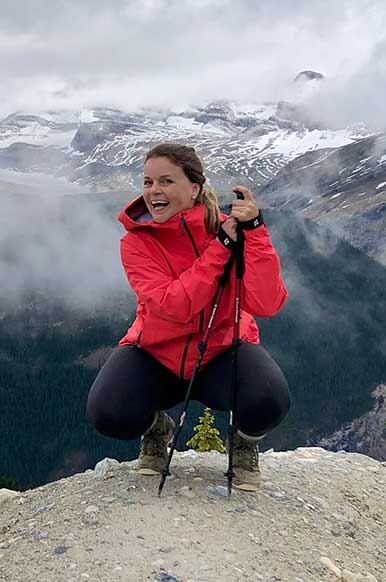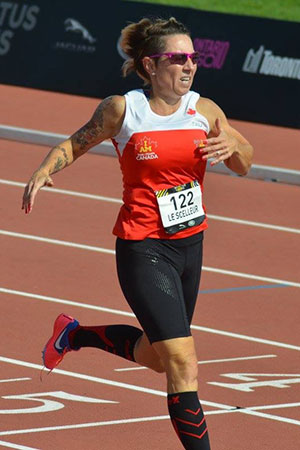Major (Ret’d) Annie Tétreault
Not many health care professionals can say that they’ve worked in enemy territory. Annie Tétreault was a critical care nurse in the Canadian Armed Forces (CAF), and she practised nursing in a war zone not just once, but three times.
Afghanistan Balkans Haiti

Joined
1996
Postings
- Valcartier: 1999-2002
- Gagetown: 2002-2004
- Valcartier: 2004-2007
- Montreal: 2007-2013
- Ottawa: 2013-2017
- Released 2017
Deployments
- Bosnia: 2001-2002
- Afghanistan: 2004
- Afghanistan: 2007-08
- Afghanistan: 2009
- Haiti: 2010
In the 1990s, the layoff and early retirement of hundreds of nurses in Quebec greatly limited career opportunities for recent nursing school graduates. Annie Tétreault was in this very situation and was looking for work. A friend of hers who was studying at the military college advised Annie to apply for the CAF’s paid education program.
With only two francophone spots available to students admitted in nursing for the 1996 CAF paid education program, she thought her chances of getting picked were slim. Despite facing roadblocks because of her short height for which she had to get a dispense, she was one of the two chosen that year.
Three years later in 1999, having earned her bachelor’s degree, she was posted to Valcartier. In fall 2001, she had her first overseas experience in Bosnia, where she participated in the stabilization mission. She was responsible for community health at camp Velika Kladusa.
“Honestly, I think Bosnia was the perfect deployment for my first experience overseas living away from family. It made me want to continue and to be deployed again.”
Tetreault’s next three deployments, which took place between 2004 and 2009 in Afghanistan, became increasingly mentally and physically exhausting.
“The weather was so bad that they had us land on a U.S. base and drive three hours to Kabul in the snow, in the middle of the night.”
During her first tour, she landed in Bagram, a three-hour drive from Kabul, in the middle of a snowstorm. “The weather was so bad that they had us land on a U.S. base and drive three hours to Kabul in the snow, in the middle of the night. I was a good shooter, but if anything had happened on the convoy, I don’t know how I would’ve reacted. My combat skills were limited.”
She had the opportunity to go to a local hospital to share medical supplies. She also worked in mobile medical clinics, which travelled to the backcountry to provide locals with medical care. She experienced complete culture shock there.

Tétreault with Afghan children.
“That’s where I witnessed women behaving submissively. As soon as a male doctor entered the room, the Afghan women would cover their faces. My face wasn’t covered, and the women would try to touch me. They’d say, ‘Is she a woman? Is she real?’ And Kabul was one of the more progressive regions! It was very strange.”
“When I left the second time, I knew for a fact that we were going to lose people. I thought I might be one of them.”
On her second tour, she was in Kandahar in the middle of the action. “When I left the second time, I knew for a fact that we were going to lose people. I thought I might be one of them.” Tétreault worked at the top-level military hospital in Afghanistan. All casualties requiring advanced care were sent there: explosion victims, gun wounds and amputations.
Although the work was difficult, she didn’t want to let her colleagues leave again without her, so she returned to Afghanistan for a third time in two years. Once again facing the horrors of war, she started to doubt her abilities even though she knew she was highly competent.
“When I arrived back in Kandahar in June 2009, my first thought was ‘What am I doing here?’ I don’t think I realized it at the time, but in 2007 I was hurting (…) every day from wondering whom we would lose and whom I might care for in the emergency room who I’d know. It was as if this time I went hoping that it would be different, but it wasn’t.”

Caring for a baby in Haiti after the 2010 earthquake.
During her last deployment in Haiti, Tétreault said she began to realize that Afghanistan had left her with permanent scars. “I was less patient; I was starting to be less empathetic.”
After Corporal Nathan Cirillo died during the shooting in 2014 on Parliament Hill in Ottawa, Major Tétreault started to see danger everywhere. “I’d hit bottom. I saw disaster everywhere. I knew I wasn’t doing well, but as a medical professional, I didn’t think it could happen to me.” She decided to seek professional help.
In 2017, after 21 years with the CAF and following a diagnosis of post-traumatic stress disorder, she was released. “I really enjoyed my time in the army even though I wasn’t quite ready to leave.” Now she volunteers helping to run the lab at a small pharmacy near her home.
With courage, integrity and loyalty, Annie Tétreault has left her mark. She is one of our Canadian Veterans. Discover more stories.
If you a Veteran, family member or caregiver in need of mental health support, the VAC Assistance Service is available to you 24/7, 365 days a year at no cost. Call "1-800-268-7708 to speak to a mental health professional right now.
Where they served
- Date modified:


















